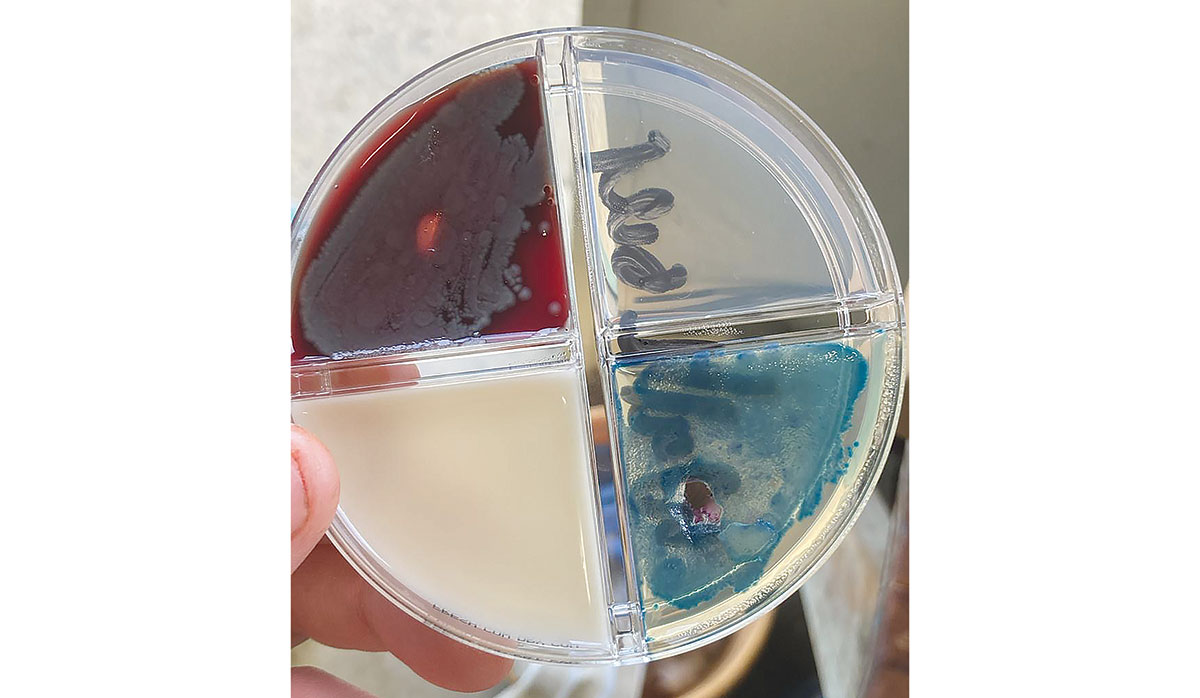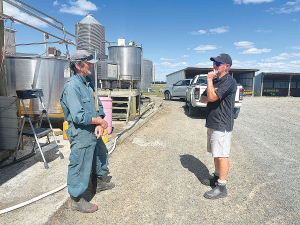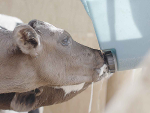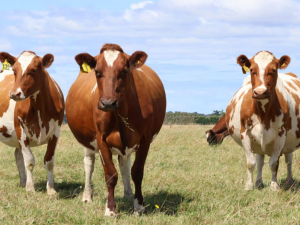Waikato farmer Craig Clausen had an unpleasant experience after an outbreak of mastitis cases on farm, suspected to be caused by the pathogen Serratia.
Bacteria don't need much in the way of nutrient to proliferate. Serratia is a mastitis pathogen which generally results in a failed mastitis treatment, often leading to a 3-teater or a cull.
From Ministry for Primary Industries (MPI) surveillance testing, the prevalence of Serratia in mastitis cultures has been increasing.
"We have farmed here for years and never has any issues like this before," says Clausen.
"For us, the water clarity and colour had always been an issue, but we'd never had issues with Serratia. We'd put in a water treatment system in 2003 to remove iron and manganese, which it did.
"A year later, however, a pink slime appeared in both post filtration water storage tanks and has been there ever since. Since the slime appeared, my mastitis rates went up. I hadn't changed any of my routines with milking; I had always used blanket dry cows, so I was rather puzzled."
Milk tests confirmed some Serratia in the milk samples taken from cows with mastitis.
"Oddly, I decided to stop teat spraying for the whole season and my mastitis rates went down."
Clausen saw an article in Dairy News about Serratia from Farm Medix in 2024 about surveillance testing for Serratia in chlorhexidine teat sprays. He was a chlorhexidine user and used the filtered water to dilute his teat spray.
"It just hit me," he says, "In the article it said Serratia is often seen as an orange slime, and that's what I saw."
Clausen spoke to his FIL area manager, Mark Mohring, who confirmed it could indeed be something in the water and switched him to an iodine-based teat spray, as it is more effective for Serratia and isn't at risk of being contaminated by Serratia.
Mohring says diluted chlorhexidine can be a source of Serratia. "We were surprised to find how it can grow to high levels in diluted teat spray from Farm Medix testing."
Clausen had his water storage tanks cleaned out, serviced the water treatment system and began testing his water every five weeks for Serratia via his vet, noting that as the temperature rose, so too did the presence of bacteria.
Farm Medix chief scientific officer, Natasha Maguire, agrees warmer water brings more risk.
After cleaning the tanks in winter, Pseudomonas, a common biofilm in water reservoirs, was detected in January. Once the water tank temperature reached 20 degrees in February, Serratia was detected again.
 |
|---|
|
Serratia is a mastitis pathogen, mostly resulting in a failed mastitis treatment.
|
Clausen says he wondered whether it was the length of time after cleaning or the temperature.
He decides to sample water from a further 18 farms in the Whitikahu area from Woodlands to Orini, testing them all at his own cost.
Water quality is an issue on many farms worldwide, especially those not on a drinking water compliant supply.
"Iron and manganese can cause issues with water, including compliance with milk processing, but high iron and manganese can cause other issues, including metallic taste, oxidative stress for cows as well as blocking pipes," says Maguire.
"The presence of iron, manganese, or the low water pH associated with them can slow down the growth of some bacteria, but it's important to remember that any water source can still be easily contaminated."
Farm Medix testing throughout the farm system found Serratia only in a pit hose.
This season, thankfully, has seen 30-50% fewer mastitis cases on Clausen's farm with the changes he has made. He has also had no cases of Serratia mastitis from samples tested.
"We have changed teat spray active, cleaned out the tanks, and we plan to have the tanks cleaned regularly to avoid issues," he says. "It is more cost effective than ionizers or UV lights, and I wanted other farmers to know about this issue and be aware of how water can cause issues with mastitis." Clausen will also use Farm Chlor tank tablets to help control the problem, since chlorinated water reduces the growth of bacteria and algae.
Reducing Risk
You can help reduce the risk of Serratia outbreak by following these steps:
- Maintain a clean water supply
- Seal and cover any tanks (lids on, cut away any branches and leaves above tanks to prevent bird poop being an issue. Make sure bores are protected from surface water getting in - they should be built higher than the surrounding ground).
- Clean water tanks and troughs out before summer, avoid water use around cows with cups off, clean areas like drains and under the bridge at the platform exit.
- Use Farm Chlor in water tanks to prevent bacterial proliferation.
- Avoid water splashing and hosing off cows.
- Use best practices for teat spray preparation.
- Make up teat spray using dedicated buckets, and use water cooled from the hot water cylinder to avoid high levels of bacteria.
- Keep teat spray tanks and vessels sealed and clean them out weekly, rather than topping them up continuously.
- Do not make up too much diluted teat spray at a time.
- It's best to seek advice based on pathogen profile, generally speaking, use iodine teat spray if you have a Serratia issue where possible, as most iodine actives are effective against Serratia, and will not support its growth in diluted teat spray products. (growth of Serratia in teat spray can make your situation worse).
- Farm Medix do not recommend stopping teat spraying. Teat disinfection after milking is a critical part of mastitis control on all farms.
- Chlorinate or use peracetic acid for tank or wash down water. Products like Farm Chlor are registered for dairy use and very effective against water born pathogens. Test the water for chlorine (Farm Source have chlorine test strips) at the final point of use (tub) at least weekly to ensure proper chlorine content, 1ppm of chlorine is sufficient.
- Lastly, if you are considering chlorination of your water supply, ensure that a carbon block filter is fitted for the entire house supply, this way all shower water, drinking water is not going to smell of chlorine. Since chlorine breaks down, stock water to troughs is fine so long as levels at the point of use are below 5ppm.
- Test your farm and cows for subclinical and clinical mastitis.
- Test mastitis cases or high SCC cows with Fresh Cow Dry Cow. This will tell you what pathogens are involved so any patterns will be picked up quickly.












